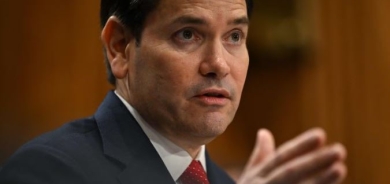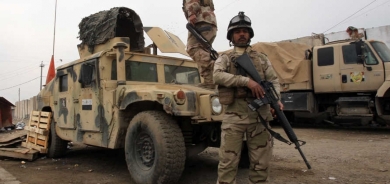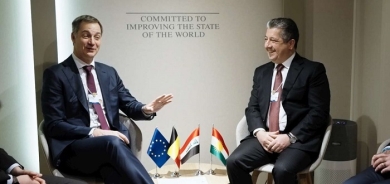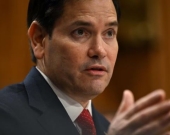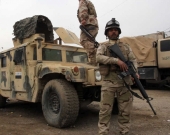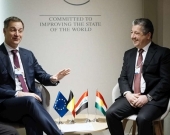Governor of Iraq Sunni heartland says U.S. to help against militants

The governor of Iraq's Sunni heartland province of Anbar said he has secured a promise of U.S. support in a battle against the Islamic State, possibly reviving an alliance that helped thwart an earlier Sunni militant threat, from al Qaeda.
Ahmed Khalaf al-Dulaimi told Reuters his request, made in meetings with U.S. diplomats and a senior military officer, included air support against the militants who have a tight grip on large parts of his desert province and northwestern Iraq.
Dulaimi said the Americans had promised to help. There was no immediate comment from U.S. officials on a day when President Barack Obama said troops sent to prepare a possible evacuation of refugees further north were standing down as U.S. air strikes and supply drops had broken the "siege of Mount Sinjar".
Governor Dulaimi said in a telephone interview: "Our first goal is the air support. Their technology capability will offer a lot of intelligence information and monitoring of the desert and many things which we are in need of.
"No date was decided but it will be very soon and there will be a presence for the Americans in the western area."
After its capture of the northern metropolis of Mosul in June, a swift push by the Islamic State to the borders of the autonomous ethnic Kurdish region alarmed Baghdad and last week drew the first U.S. air strikes on Iraq since the withdrawal of American troops in 2011.
U.S. involvement in Anbar is a far more sensitive matter.
The region, sparsely populated and forming much of Iraq's border with Syria, was deeply anti-American during the U.S. occupation. Tribal leaders and local people saw the replacement of fellow Sunni Saddam Hussein by a U.S.-backed leadership dominated by Iraq's Shi'ite Muslim majority as a threat and took up arms. Al Qaeda fighters flooded in to join them.
The United States mounted its biggest offensive of the occupation against a variety of Islamist militants in the Anbar city of Falluja, just west of Baghdad. Its soldiers experienced some of their fiercest combat since the Vietnam War.
Eventually, the U.S. military was able to persuade some of its most diehard Sunni opponents to turn against al Qaeda.
The strategy brought a period of calm. But Prime Minister Nuri al-Maliki, now being replaced by a less polarising colleague among the Shi'ites, went on to alienate many Sunnis.
The Islamic State, disowned by al Qaeda as too radical after it took control of large parts of Syria, capitalised on its Syrian territorial gains and sectarian tensions in Iraq to gain control of Falluja and Anbar's capital Ramadi early this year.
"PR0MISE"
It is not clear how much support Dulaimi would have locally for cooperation with the Americans. Elected last year, some in the region have criticised him for working too closely with Maliki rather than defending Sunni interests.
Iraq's president has nominated a new prime minister, Haider al-Abadi, who is seen as a moderate Shi'ite with a decent chance of improving ties with Sunnis.
The Sahwa, the U.S.-funded militia drawn from the country's Sunni Muslim tribes, were a driving force in fighting al Qaeda from 2007. A U.S. decision to hand over responsibility for the Sahwa to the Shi'ite-dominated government in 2009 alienated them and drove some to join IS.
Abadi is in the sensitive process of trying to form a new government in a country where sectarian tensions are rising; bombings, kidnappings and executions are part of daily life.
On Thursday, a bomb attached to a bus in central Baghdad killed three people and wounded six, police and medics said.
Bloodshed is back at the levels of 2006-2007, the peak of a sectarian civil war.
Abadi faces the challenge of trying to rein in Shi'ite militias accused of kidnapping and killing Sunnis and persuading the once dominant Sunni minority that they will have a bigger share of power.
Maliki is still refusing to step aside despite months of pressure to do so from Sunnis, Kurds, some fellow Shi'ites, Shi'ite regional power Iran and the United States.
It is not clear whether he still commands the loyalty of special forces or Shi'ite militias - just about the only leverage he may have left.
Dulaimi was especially concerned by the militants' determination to seize control of Anbar's Haditha dam: “The situation in Haditha, where the dam is, is controlled by security forces and tribes. But the problem is how long can they endure the pressure?" said Dulaimi.
"I held several meetings since one month ago with the American embassy and the commander of the central troops all in this regard, and very soon there will be a joint coordination centre and operations in Anbar. They gave a promise."
Aside from strong momentum built up in the north and control of large parts of the west, the Islamic State has threatened to march on Baghdad.
ARMING THE KURDS
The group, which wants to redraw the map of the Middle East, used tunnels built by Saddam in the 1990s to move its fighters, weapons, ammunition and supplies to towns just south of Baghdad, Iraqi intelligence officials told Reuters.
Unlike Osama bin Laden's al Qaeda, which set its sights on destroying the West, the Islamic State has territorial goals, aims to set up a caliphate and rages against the Sykes-Picot agreement of 1916 between Britain and France that split the Ottoman empire and carved borders across the Arab lands.
Rough terrain has enabled the militants to evade the army and security forces. Seizing Baghdad would be difficult because of the presence of special forces and thousands of Shi'ite militias who have slowed down the Islamic State elsewhere.
But a foothold just near the capital could make it easier for the IS to carry out suicide bombings, deepen sectarian tensions and destabilise Iraq.
On Thursday, Islamic State militants massed near the town of Qara Tappa, 120 km (75 miles) north of Baghdad, security sources and a local official said, in an apparent bid to broaden their front with Kurdish peshmerga fighters.
The movement around Qara Tappa suggests they are becoming more confident and seeking to grab more territory closer to the capital after stalling in that region.
"The Islamic State is massing its militants near Qara Tappa," said one of the security sources. "It seems they are going to broaden their front with the Kurdish fighters."
It is not just superior firepower seized from Iraqi soldiers who fled its advance that gives the group an edge over enemies. It has an array of economic weapons as well - the massive Mosul dam, five oil fields, wheat crops and cash from captured banks.
Islamic State fighters staged a bank robbery in the recently conquered town of Jalawla, northeast of Baghdad, on Thursday, witnesses said.
While pressing for more territory, Islamic State fighters use fear and intimidation to tighten their grip on towns and cities they control and impose their radical view of Islam.
With ethnic Kurdish peshmerga forces pushed back on the defensive by the Islamic State this month, France has joined the United States in supplying what it called "sophisticated arms" to the regional militia and EU foreign ministers will break summer holidays to discuss the crisis on Friday.
WOMEN DOCTORS, YAZIDIS
In Mosul, Iraq's second biggest urban centre, the militants have blown up or bulldozed Shi'ite mosques and shrines, destroyed statues of poets which they deem un-Islamic and forced women to veil.
On Thursday, women doctors in Mosul said they faced the Islamic State's wrath.
“One of them is hitting any girl (doctor, nurse or a visitor) on her head as a warning to her especially after the period they gave for starting the application of scarf wearing," said a female doctor.
"They are intimidating us, threatening us with killing and destroying our houses. Because of that bad treatment I decided to sit in my house and not to go to the hospital, but still feeling afraid as I don’t know what they will do."
In Diyala province, northeast of Baghdad, Islamic State militants shot dead four policemen in a public area - men who were on a hit list - said security sources and witnesses.
They also confiscated 20 houses once inhabited by security personnel and wrote "Property of the Islamic State" on the walls.
In addition to arming the peshmerga and, in the case of Washington, bombing militant positions, Western powers have been trying to help aid agencies drop supplies and provide refuge for tens of thousands of people, many of them from non-Sunni communities, who have fled attacks by the Islamic State.
The White House had said the United States and its allies were considering setting up airlifts and safe land corridors to rescue people, including many from the Yazidi sect stranded on the arid heights of Mount Sinjar near the Syrian border.
But a U.S. assessment team sent to Mount Sinjar on Wednesday found the situation better than expected, and Obama said further evacuation or airdrops were unlikely.
(Writing by Michael Georgy; Editing by Peter Millership)
Reuters


